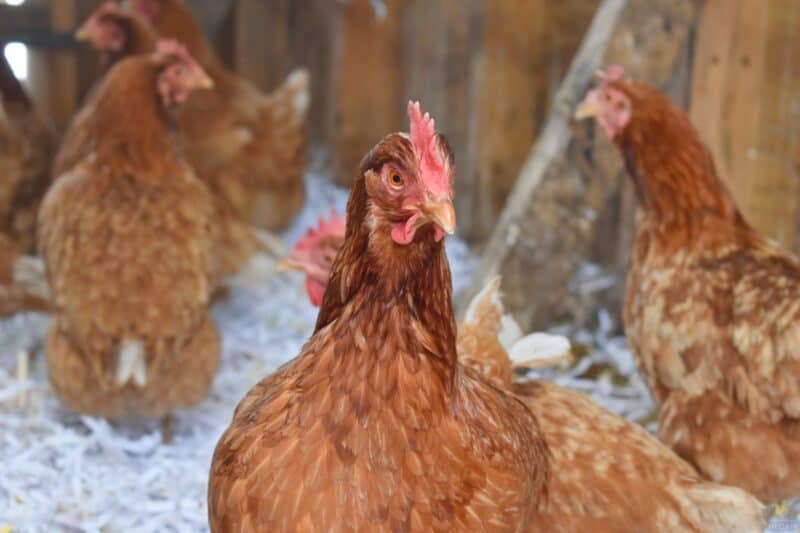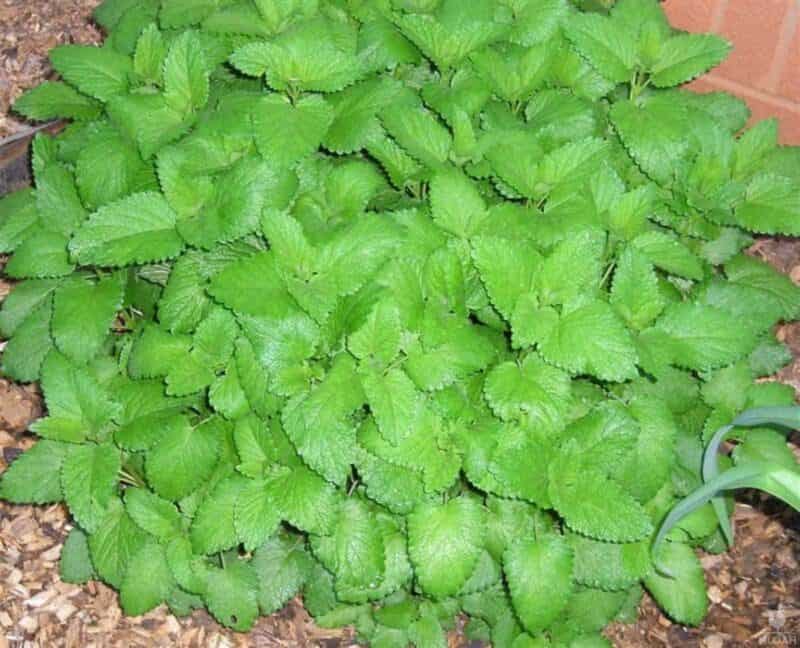Left to their own devices, chickens will eat all sorts of things. Some of their favorite foods are plants. Veggies, fruit, leaves, seeds, roots, and more: there are very few that don’t wind up on a chicken’s menu!

Naturally, caring owners like to supplement the diet of their chickens with whole, fresh inclusions from their own kitchen for good health and to keep their chickens engaged and interested.
But, not all of the things that you and I eat are safe for chickens. How about lemon balm? Can chickens eat lemon balm?
Yes, chickens can safely eat lemon balm. Lemon balm is full of the B vitamins complex and polyphenols, and can boost a chicken’s immune system when eaten regularly.
Lemon balm is often used as a bracing, minty herb or ingredient in tea, but to your chickens it is just another tasty plant, although it is one that has some pretty serious health benefits.
Keep reading, and you can learn everything you need to know about giving lemon balm to your birds.

Nutritional Profile of Lemon Balm
Compared to other plants and especially other herbs, lemon balm is not particularly nutritious if you look at vitamins and minerals alone.
It does contain a little bit of protein and a few carbs, but the vitamin content, at least concerning significant vitamins, is limited to vitamin C and folate. It has just a little bit of vitamin B1, vitamin B6, and vitamin E.
The mineral content is somewhat better, but a good amount of calcium, potassium, phosphorus, and magnesium, along with far lesser amounts of iron and zinc. It also contains a little bit of sodium.
All told, not too bad but definitely not a standout for your chickens.
Benefits of Lemon Balm for Chickens
The B-complex vitamins in lemon balm are essential for chickens as they play an important role in their overall health and well-being.
They help chickens to process and utilize the energy from food, maintain healthy skin, eyes, liver, and nervous system functioning, and produce red blood cells.
They also support a healthy immune system to help fight off disease. Chickens need calcium for strong bones and eggs, as well as magnesium for healthy feathers, joints, and digestion.
Iron is always important for birds, as it helps to create hemoglobin in the blood and carry oxygen around the body.
Though the vitamins and minerals present in lemon balm are always beneficial for your birds, the true benefit of lemon balm is that it contains compounds known as polyphenols.
These have been proven to improve immune system health in various studies conducted on broiler chickens.
This isn’t conjecture or anecdotal research, either: multiple entirely documented scientific studies have been conducted around the world on the subject.
These antioxidant compounds are effective when the leaves of the plant are fresh and eaten, or when an extract is made from the leaves and placed in water, like a tea.
Considering that it is pretty easy to give your chickens lemon balm as a supplement in their usual diet, there is no reason you shouldn’t!
Can Chickens Eat Fresh Lemon Balm?
Yes, chickens can eat fresh lemon balm, and this is the ideal way to give it to them if you want to maximize its benefits. As a rule, dried plant matter isn’t as nutritious as fresh, and that applies to lemon balm also.
Can Chickens Eat Lemon Balm Stems?
Yes, they can, though some chickens don’t like them. The stems are a bit more fibrous than the leaves and can be tough on some chickens’ digestive systems.
If your birds want to eat them, let them, but don’t worry if they ignore them.
Can Chickens Eat Dried Lemon Balm?
Yes, but as mentioned above dried herbs and plants are not as nutritious as fresh.
The drier the lemon balm gets the more nutrients it loses, so if you want to maximize the health benefits of the plant make sure to stick with fresh.
Still, it can make a good winter snack…
Can Chickens Eat Cooked Lemon Balm?
Yes. Cooked lemon balm is safe for chickens, but once again it loses its nutritional value when cooked.
Still, if you want to toss some lemon balm leaves to your chickens after making tea or mix them in with their food to minimize waste, that’s just fine.
Never Feed Lemon Balm to Chickens that Has Been Prepared with Harmful Ingredients
Lemon balm is used as an herb in various dishes, and routinely in tea preparation.
That’s all well and good, but you must be cautious to never feed your chickens any lemon balm that has been made with anything that they shouldn’t eat, or used as an ingredient in any dish containing the same.
The lemon balm might be fine, but things like salt, sugar, butter, oils, and so forth are not good for your flock.
Any of them could cause harm to your chickens, and lead to such horrible health conditions as hypertension, salt poisoning, fatty liver syndrome, and heart failure.
You don’t want anything like that to happen to your birds, so do make sure you only feed them fresh, wholesome lemon balm and definitely don’t feed them any “people food” made with it, with the possible exception of tea. More on that in one second.
Beware of Pesticide on Store-bought Lemon Balm Plants
There is one more issue you’ll need to be aware of when giving your chickens lemon balm, but only if you are buying the plant or fresh leaves from a nursery or a store.
Pretty much all plants sold commercially, lemon balm included, have been treated with some kind of pesticide or another to help them stay disease free and looking good until they make it to market.
That works, of course, but these pesticides are often extremely harmful to chickens and other animals.
Your birds should never eat any lemon balm plants that have been treated with harmful chemicals, and just washing the plants is unlikely to remove all traces which can still slowly accumulate in their bodies over time.
The answer is to only get certified organic and pesticide-free lemon balm if you plan on feeding any to your birds, or to just grow it yourself so you know exactly what goes into it.
How Often Can Chickens Have Lemon Balm?
Chickens can eat lemon balm periodically, usually no more than once or twice per week. Too much of a good thing isn’t necessarily better, and that applies to lemon balm.
Preparing Lemon Balm for Your Flock
There are several good ways to prepare lemon balm for your flock, and with any of them they will benefit from the nutrition and improvement in their immune health.
The first and simplest way is to just let them munch on the leafy branches taken from fresh, whole plants.
You can also combine the leaves with their regular feed, though you’ll need to make sure that they are finely chopped.
Chopping the leaves and tossing them in the feed with just a dash of olive oil can help them stick to the pellets.
The last way to help your flock get the benefits of this herb is to make a sort of tea (really a tisane) from the leaves, and add that to their waterer.
Simply steep the leaves for 10 to 15 minutes and then strain off the liquid.
This can be added directly to their drinking water once it’s cooled, which may be easier than trying to mix it into their feed. This will provide the immune-boosting properties all the same.
Can Baby Chicks Have Lemon Balm, Too?
Yes, chicks can also eat lemon balm, but this is one supplemental food that you’ll want to wait until they are a little older to try for the first time.
Generally speaking, you should wait until your chicks are at least 6 weeks old before giving them any type of supplemental food like lemon balm.
Tom has lived and worked on farms and homesteads from the Carolinas to Kentucky and beyond. He is passionate about helping people prepare for tough times by embracing lifestyles of self-sufficiency.
